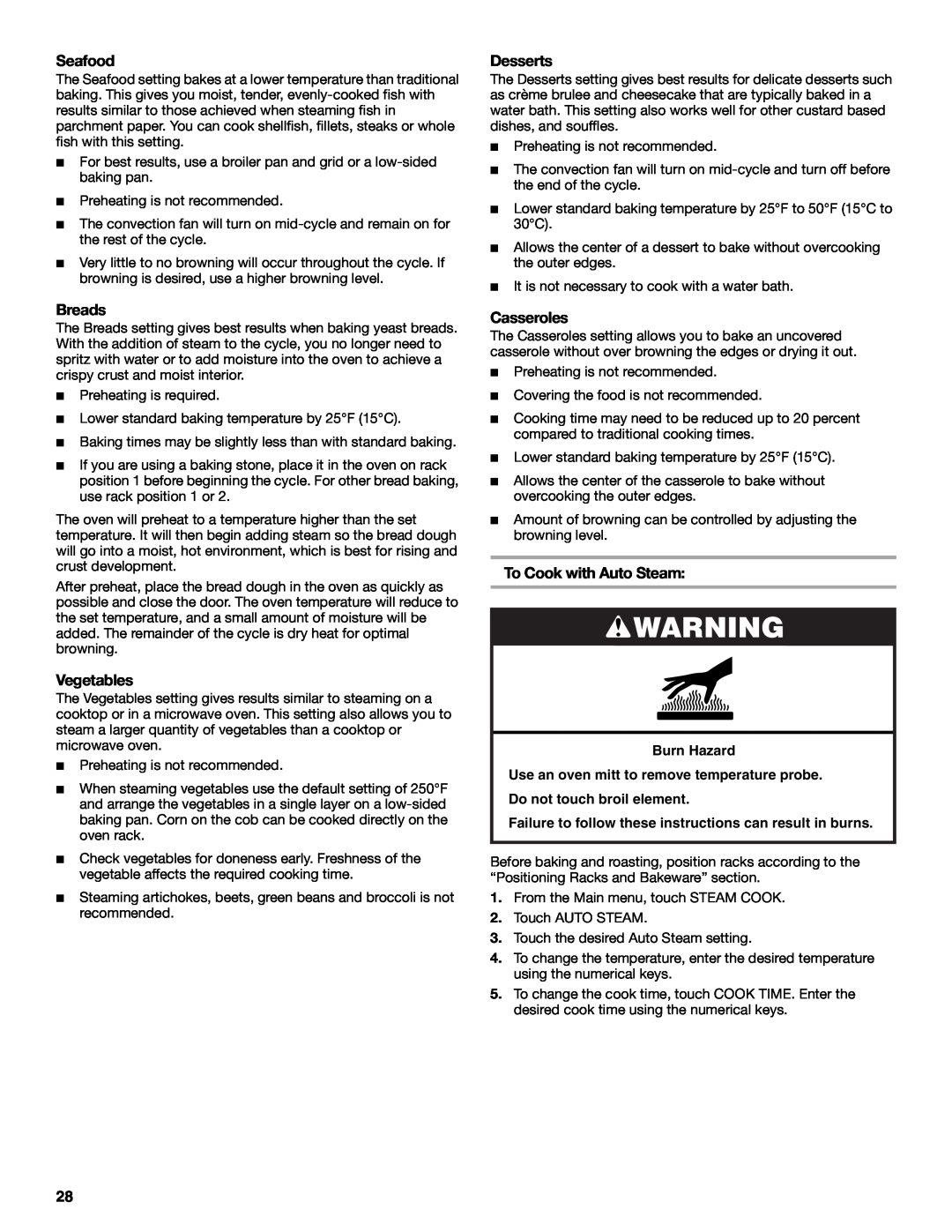
Seafood
The Seafood setting bakes at a lower temperature than traditional baking. This gives you moist, tender,
■For best results, use a broiler pan and grid or a
■Preheating is not recommended.
■The convection fan will turn on
■Very little to no browning will occur throughout the cycle. If browning is desired, use a higher browning level.
Breads
The Breads setting gives best results when baking yeast breads. With the addition of steam to the cycle, you no longer need to spritz with water or to add moisture into the oven to achieve a crispy crust and moist interior.
■Preheating is required.
■Lower standard baking temperature by 25°F (15°C).
■Baking times may be slightly less than with standard baking.
■If you are using a baking stone, place it in the oven on rack position 1 before beginning the cycle. For other bread baking, use rack position 1 or 2.
The oven will preheat to a temperature higher than the set temperature. It will then begin adding steam so the bread dough will go into a moist, hot environment, which is best for rising and crust development.
After preheat, place the bread dough in the oven as quickly as possible and close the door. The oven temperature will reduce to the set temperature, and a small amount of moisture will be added. The remainder of the cycle is dry heat for optimal browning.
Vegetables
The Vegetables setting gives results similar to steaming on a cooktop or in a microwave oven. This setting also allows you to steam a larger quantity of vegetables than a cooktop or microwave oven.
■Preheating is not recommended.
■When steaming vegetables use the default setting of 250°F and arrange the vegetables in a single layer on a
■Check vegetables for doneness early. Freshness of the vegetable affects the required cooking time.
■Steaming artichokes, beets, green beans and broccoli is not recommended.
Desserts
The Desserts setting gives best results for delicate desserts such as crème brulee and cheesecake that are typically baked in a water bath. This setting also works well for other custard based dishes, and souffles.
■Preheating is not recommended.
■The convection fan will turn on
■Lower standard baking temperature by 25°F to 50°F (15°C to 30°C).
■Allows the center of a dessert to bake without overcooking the outer edges.
■It is not necessary to cook with a water bath.
Casseroles
The Casseroles setting allows you to bake an uncovered casserole without over browning the edges or drying it out.
■Preheating is not recommended.
■Covering the food is not recommended.
■Cooking time may need to be reduced up to 20 percent compared to traditional cooking times.
■Lower standard baking temperature by 25°F (15°C).
■Allows the center of the casserole to bake without overcooking the outer edges.
■Amount of browning can be controlled by adjusting the browning level.
To Cook with Auto Steam:
![]() WARNING
WARNING
Burn Hazard
Use an oven mitt to remove temperature probe. Do not touch broil element.
Failure to follow these instructions can result in burns.
Before baking and roasting, position racks according to the “Positioning Racks and Bakeware” section.
1.From the Main menu, touch STEAM COOK.
2.Touch AUTO STEAM.
3.Touch the desired Auto Steam setting.
4.To change the temperature, enter the desired temperature using the numerical keys.
5.To change the cook time, touch COOK TIME. Enter the desired cook time using the numerical keys.
28
